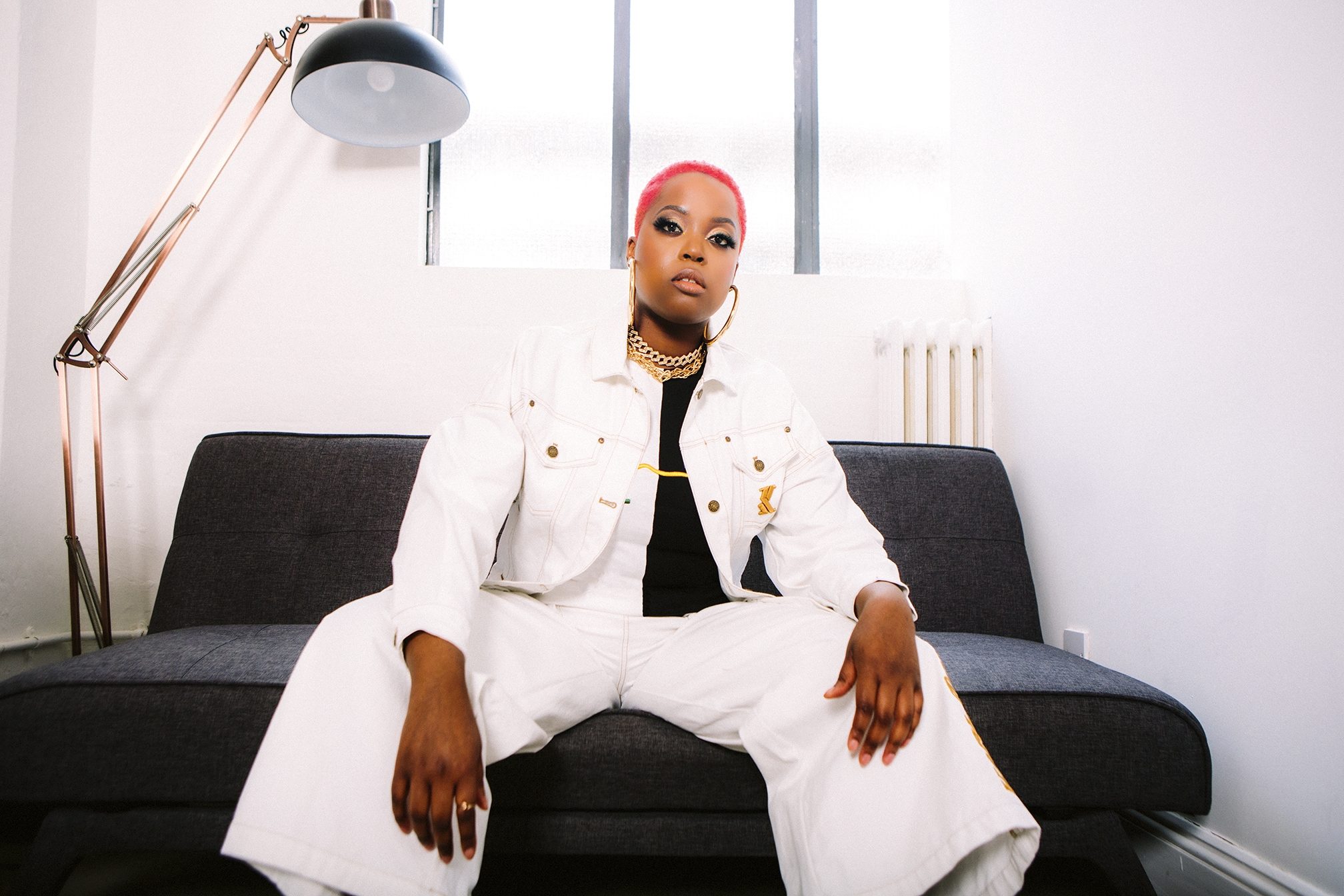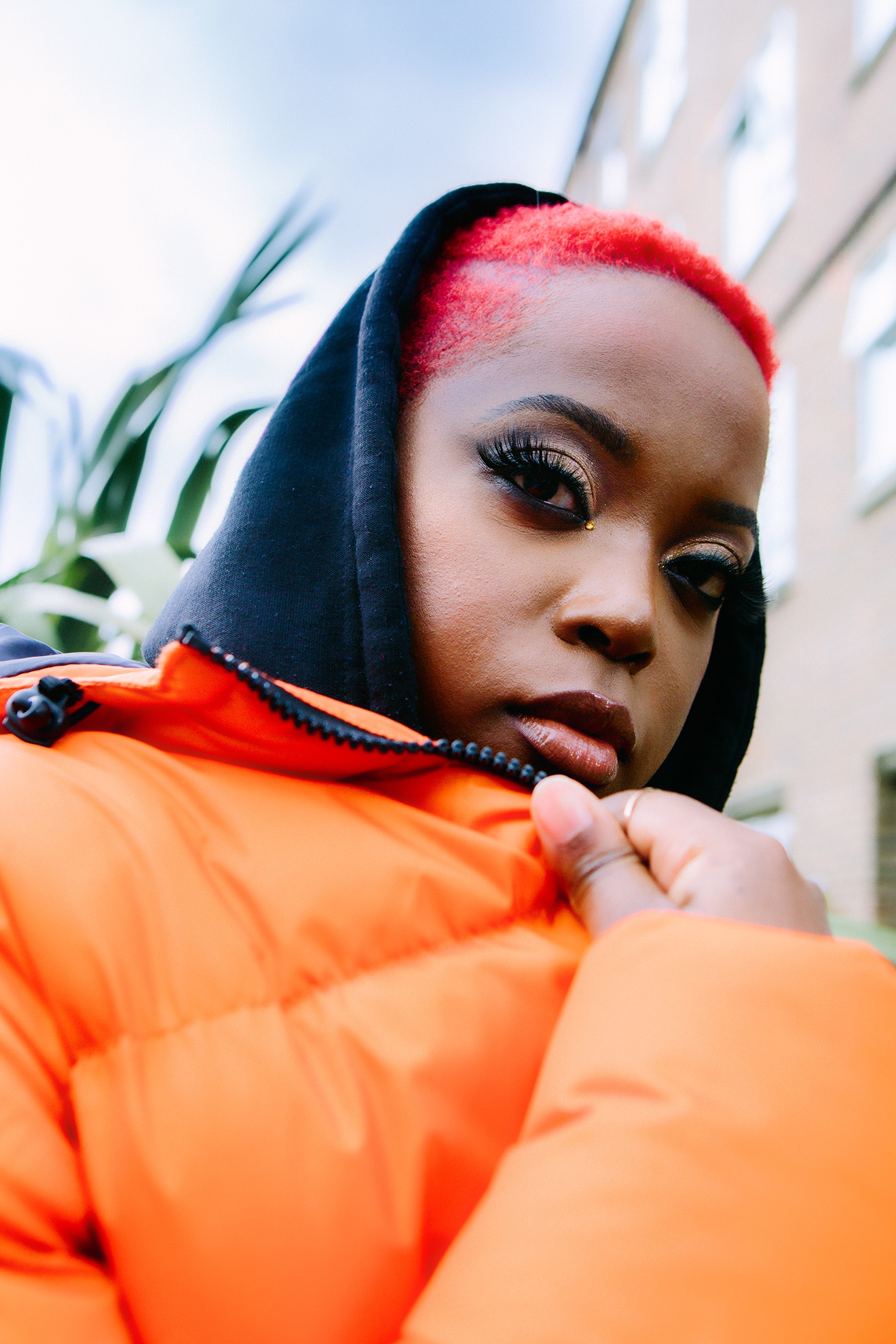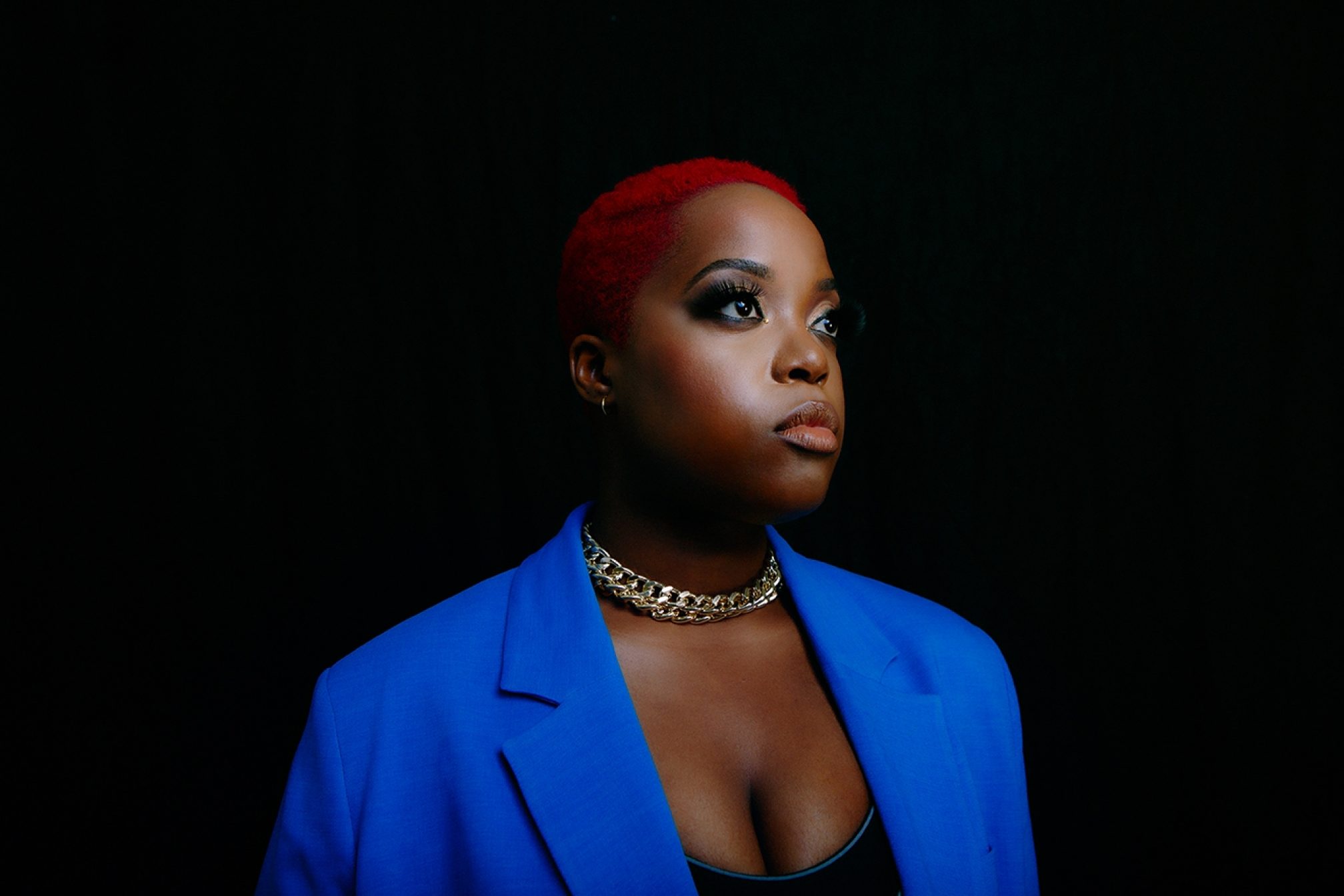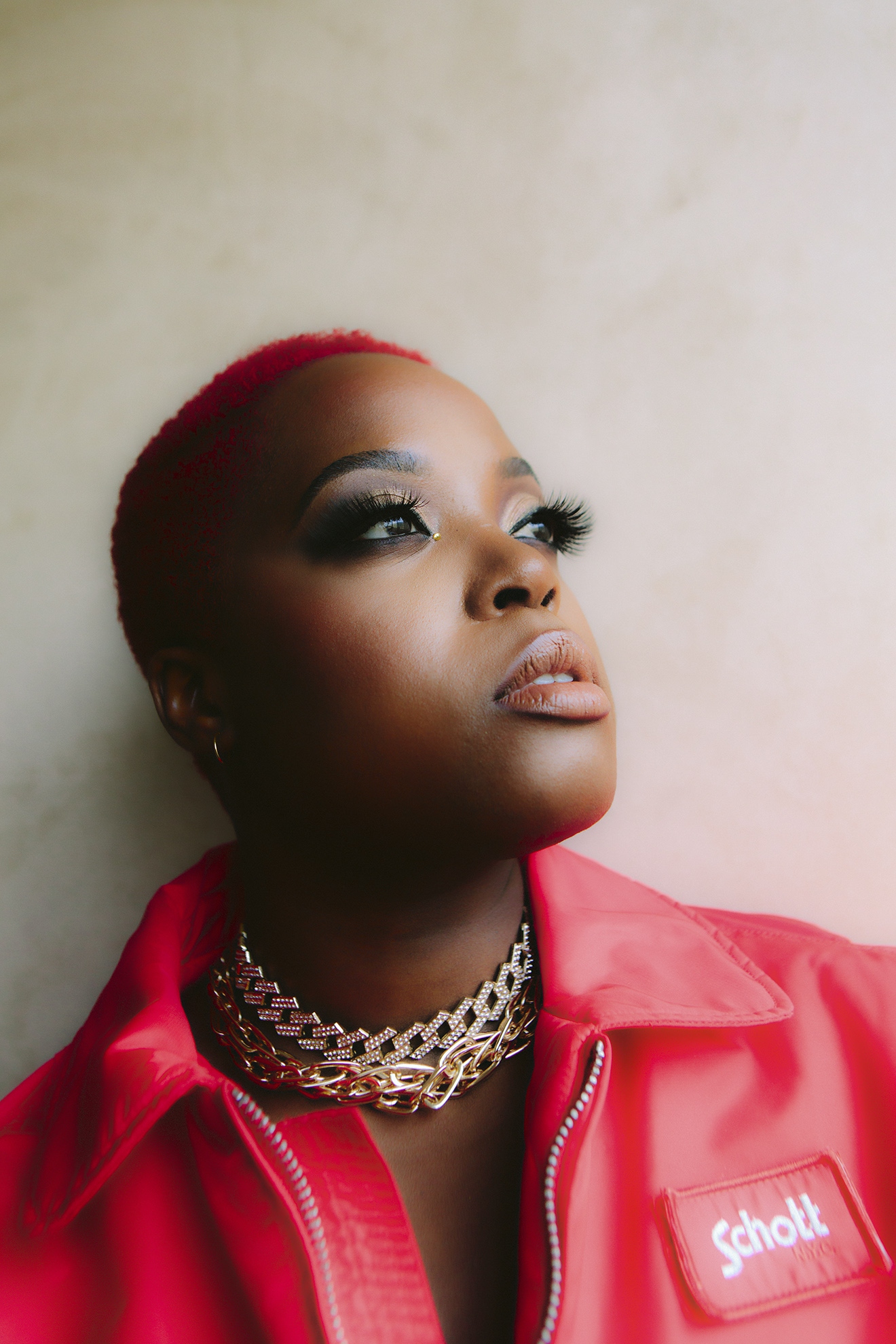 Features
Features
Karen Nyame KG: "I tell my story to highlight how progressive the music industry has become"
Tice Cin speaks to the Goddess of Rhythm about misogynoir in music, building authentic artist connections to make collaborative, and learning to be her unapologetic self
Karen Nyame KG made her way into the early UK funky scene at a time when establishing yourself as a key player was just as much about endurance and confidence as it was musicality. From making herself known with soulful tracks like ‘Feeling Funky’ and ‘Midnight’ to playing at the likes of Touch FM in north London to going on to join her first community radio station, Westside Radio – KG’s work rate was vast. Like a lot of people starting out in the industry, she would produce overnight demos without knowing where her tracks would go, and circa 2007, put her name out there on specialist Facebook groups that required you to perform and prove your expertise in order to get a look in. She gradually built her name as the “Goddess of Rhythm” but soon withdrew from music. The early 2000s UK funky scene was dominated by men, with insidious barriers such as misogynoir and colourism that made it increasingly difficult to maintain a healthy musical career.
Read this next: Why didn't UK funky break the mainstream?
KG was always meant to be in music though. No hobbyist, her natural affinity with music had her intuitively locking into the drum kit her dad bought her as a child to programming house loops by eight years old. An only child, she shares: "I was a bit of a weird child, into technology and obsessed with creating sounds instead of playing with your average Barbie doll." Fortunately, this innate musicality and percussive virtuosity would eventually be celebrated in 2018 with a reissue of her long-lost tracks from Goon Club Allstars. Her 2020 EP 'Sensei' featured remixes from ballroom star quest?onmarq, and hinted at the artistic questions she would be exploring in 'Sensei II'. The project spans UK funky, gqom, R&B, Akan Highlife influences and more, with collaborations from Aymos, Toya Delazy, Taliwhoah and Mista Silva. KG has found a balance, between bringing in new elements to her work and having her distinctive sound. There’s the gentle openness of ‘Mantra’, her song with Taliwhoah that rests in high vibrations, "If it’s meant to be it’ll be / I’m not one to feel things, if they’re not real things". At the same time, ‘Koko’, her long-time coming collaboration with Mista Silva is a sugar-touch of a song that recalls wining in a summer club. Underpinning the entire EP is a celebration of artists from Africa and its diaspora, from the Zulu on ‘Nzinga’ to the guitar riffs that conjure images of the highlife bands her mother introduced her to.
Read this next: 17 women shaping African dance and electronic music

We spoke about her journey to making 'Sensei II', protecting your artistic wellbeing, safe spaces in music and her artistic process:
"I love organic connections. It’s about synergy. Authenticity translates through music. I always have great relationships with people I collaborate with because I feel like that magic can then seep through the art that we create. I tend to build relationships before studio because it is a way of vetting and seeing if you can vibe, because ultimately I’ll have to take away from that session and build something. For example, on this project, conversations were had beforehand with everyone. I think that’s the main reason why the EP sounds that way, because of that initial electricity. I mean I’ve known Mista Silva for ten years, when I was on my way out of music in 2010 but at that time, the vibe wasn’t there. Now he’s featuring on this project - a staple one at this time in my career - it’s a beautiful thing. It goes to show, when it’s the right time, it’s the right time. Divine timing."
The industry has changed in some significant ways since 2010, though misogynoir and colourism is still an insidious problem. KG speaks about how essential it is to orchestrate safe spaces within music.
"Through my journey discovering who I am in music, and who I am as a woman – I’ve been able to establish my core values and standards. Now I approach the industry with much more caution. There are now more safe spaces for Black women in music, and in electronic music in particular. Places where I can thrive and not have my competencies questioned or safety compromised in any regard, I can create freely and be trusted to create freely. Before, there’d be stigmas, even when approaching women who sing because they wouldn’t trust you. It wasn’t seen as normal for women to be on the buttons and controlling the desks in the music studios. The trust wasn’t there because women producing music was such a rarity, but now it’s becoming common. Those barriers being broken down make it easier to create in the first place.
"My therapist always says to me that whichever stage of your journey that you are at, that you have to share your story. I’ve often said, I wish there was a me for me in my early twenties. It was a very isolating time for me, and to know that there is a bigger sense of community now gives confidence to operate with a truer sense of self. I share my story to highlight how progressive the music industry has become in comparison to a decade ago where having women-led workshop series or women-led radio stations were unheard of. We’re still fighting that battle in regards to line-ups though. Line-ups are so predictable. Imagine an airport where a plane is landing – we’re the people waving it down with glow-in the dark sticks, ‘we’re here! Can you not see us?’ Does it always have to be a trending topic on Twitter for action to be made?"
Read this next: The exploitation of Black women vocalists in house
Our current social media environment of artist-led music profiles and quick-share flows has played a role in creating the community, with immediacy of communication and visibility improving access to KG’s artistry. She outlines her experience of social media as an artist.
"The music industry is a microcosm of the real world, opportunities were few and far between. Social media has almost bridged the gap between your label, A&R and more. It has been a tool in regards to sustaining and improving my visibility. I was on Facebook years ago when I first started uni, and all I could really do was hop into specialist Facebook groups full of men, ego and bravado, and hope that they would play my music on pirate radio stations. These bespoke groups dedicated to the UK funky genre. With Facebook groups people have to remember that these are collectives that have formed their spaces, so I’m over here infiltrating these spaces without necessarily being invited. It was very daunting, and very ballsy if I do say so myself, because though the computer screen between you gave you increased confidence, you knew the group would have a collective mindset. If they didn’t like you, you’d have numerous people saying your stuff is shit, live on a wall for everyone to see. Otherwise, I’d try to find a DJ’s name and hope to slide into their inbox but that came with a lot of ambiguity, and you never knew what type of response you’d get. The spectrum of contact is so wide now, and I do feel like there are cons to it, but for the most part, the ability to be seen and get to the person you need to get to is easier.
"I regulate my social media usage as much as I can because it encourages a tendency to compare and becoming engrossed in the timeline. Supporting others is at the forefront of what I use it for – community. I’ve made great friends on there."
Read this next: Social media is dangerously affecting DJs' mental health
KG is known for her support of other artists and celebrating her peers. She cites friends such as Hagan as one of her musical muses, an artist who she has known for years, and stresses the importance of uplifting your community.
"A lot of people will feel that me being nice is somewhat contrived, because unfortunately the industry that we’re in, people will be nice to you with an aim to gain. People are shocked when they meet me in person and find I’m the same in-person as I am online. I’m all about authenticity and have had to do so much internal work to get to that point. I vet my surroundings the same way I curate my Rekordbox before I’m trying to put the music on my USBs, I’m very intentional about who I support and with a lot of the people that I do support, these connections are all transformational connections.
"Your personal and creative will merge together, so you’re going to be around the people that you work with more often because those are the spaces you move in more frequently. It’s important to make those spaces as healthy as possible, with people who understand boundaries, when you’re at capacity or not in order to do the work or not. That alone won’t make music a chore for me. Before, I was consistently burnt out and around people who just desired more from me without considering where my physical and emotional health was. Those things are part of my artistic health too, if I’m not right personally, how can I create? Now, the people within my environments respect my personal and creative space, which has made music a more pleasant realm to move in now. I guard those parametres very carefully, as opposed to before. It’s down to boundary setting."

Initiatives that help foster wellness and safe spaces for artists are gradually increasing. KG is directly involved with some of these, creating communities that were not accessible to her in her early career, such as the music production workshops that she runs alongside Red Bull Music. We discuss the frameworks and systems of ethics that can help facilitate careers in music.
"The Normal Not Novelty workshop series that I’ve been a production lead for is aimed at women and non-binary folks. We strive to encourage and advocate for people like myself who want to acquire skills without the judgemental energy that we tend to face when venturing into the technical side of the music industry. Unfortunately gender has always been a determining factor to gatekeepers for how you process information and your competency, so series like this are about removing those stigmas attached and creating a hub where you can learn freely. Normal Not Novelty has been going on for a while but I didn’t become privy to things like that until my late-twenties, and that would have been so valuable to me when I started out. Support systems with other people that look like you, share the same values and are safe learning spaces. These are the things that help you go after your skills. Why would you feel like going after your passions if you’re dealing with men trying to abuse their authority in that regard, judge you or be condescending during the learning process? With Normal Not Novelty, you’re surrounded by women and non-binary folks who are soaring in their careers, built from being technically exceptional and efficient.
"Foundation.FM being woman-led. Ami Bennett, Becky Richardson, Frankie Wells. Amazing women. Healthy spaces with a willingness to push other amazing women into the industry, give and equip them with the tools to prepare for commercial radio, to be a touring DJ and even purely the opportunity to play. I think Foundation plays a big part in shaping and developing talent."
Read this next: All-woman collectives have instigated real, positive change in the music world
KG’s 2019 'Touch' EP with Scratchclart (AKA Scratcha DVA) was a genre-making and experimental project, fusing South African gqom with UK funky to ephemeral effect. So how do artists follow their own instincts when experimenting with new sounds?
"That’s all part of the development. Even if something is as leftfield as a song like ‘Touch [Reprise]’ where Scratcha and I wanted to go down a sound-track euphoria and ethereal approach to South African gqom, and to expand on that. Naturally Scratcha has that musical palette in general, the way that he approaches his music, you can’t even categorise it because of its many layers and spectrums. With my background in music, I have an ear for those melodic ‘eargasms’. It was natural, that project, and emotionally provoking. The connotations of experimental are that it’s going to something that’s unrelatable. For me, if I’m talking experimental, I still want it to be something that an R&B lover can say ‘ooh, I like that, whatever that is’, even if it’s something they’ve never heard before. People just assume that it’s banging some wood together and that’s it. If I’m going to do experimental, I’m going to make sure that even the most linear of music listeners can relate to it.
"With the remixes that I’ve done, there’s always this signature formula that I just invert across different projects. It’s important for producers to have identity. Hagan and I talk about this all the time, I’ll hear a song on SoundCloud and think ‘that sounds like a Hagan track’ because his essence is so strong. That’s beautiful to me. In this time, we have a digital archive where everything is catalogued, so why not make your art tangible? Make sure that it has every part of you in it. Material like that can really live on. There will never be another Prince, Diana Ross, Michael Jackson, Whitney, Luther Vandross. All of these artists are distinctive in what they brought to music, and this why they’re still being talked about. Children’s children’s children will know about these staple pillars of music because of them being their authentic selves and making sure they put that at the forefront of everything they do. That’s what I’m determined to do. I’ve gotta be me."
KG has worked with UNIIQU3 on ‘B2B’ / ‘Black Roses’ for Jamz Supernova’s Future Bounce compilation and with Amapiano royalty with Aymos on ‘Mani Dakiwe’. Connecting internationally with scenes like Jersey club has been a gratifying experience for her.
"These are international artists that have so much to them. UNIIQU3 being the queen and point of reference when it comes to Jersey club and Aymos being the point of reference when it comes to Amapiano – for them to trust and align with me is beautiful. The music in this trans-Atlantic fusion that takes place crosses so many bounds, and the relationships that can be built off the back of music is inspiring. Before, I was only honing in on my own territory. If you’re not careful, you can be stuck in your own surroundings, but pulling from these artists and their life stories – what they’ve been through and created through their career’s trajectory, to have those influences then inserted into my sound, nothing but great music can come from those collaborations.
"I feel like that’s one of the reasons why I got bored in the first place. I wanted more than a one-dimensional outlook on life. If I only moved in my territory then I’d always be creating the same thing. Linking up to other artists from other places has been very special."
Read this next: The beautiful chaos of Amapiano, South Africa's emerging house movement
The music making process in the UK funky scene often concocts images of packed studios with people vibing but the subtle intricacy of KG’s sound makes for another approach.
"Usually, I get my artist to come in, we vibe, connect, talk about each other’s lives – it’s a ‘tell me your story’ type thing. I call it the ‘break-in session’, I’ll perhaps show them a makeshift template I’m working with, we’ll song write together and discuss the title. The template could be something I’ve melodically built before the essence of the track has been added, and the essence is often my characteristic percussion. I take that away. They have to leave in order for me to zone into that process and get techy. Even my creation process is very intimate, it helps me to focus. I’ve been in certain scenarios where there have been multiple people in the studio but I don’t like it. The sessions you see on TV, 10 guys sitting down there. A lot of distraction. When I connect in my music, it’s a very personal exchange and even if it’s an initial meeting of two minds with the artist I’m working with, I always need to go away, let the track marinate, and then hone in on it privately. I also genuinely like my own space and to vibe by myself."

Her name KG comes from when she would MC as Killer Gyal, a source of some banter looking back, but also another indication of her affinity for production.
"I’ve been song making for a while and MCing definitely played a part. I was making tracks for other girls in the classroom as well so you could say I had an early start in producing from there, as corny as that sounds! That scope of tailoring an energy to an individual, I learnt that from a very young age. Even though you can feel my signature all over the EP or my music in general, it’s always that essence of the artist that I tend to bring out."
KG has prioritised stepping out of the producer/DJ bracket, going towards record making. After near 20 years producing and programming, she’s making technical shifts with projects like 'Sensei II'.
"Now we’re not just focusing on producing dubs for the club, even though that’s definitely the cloth I’m cut from. I’ve upgraded my equipment to accommodate that, from new production tools to plugins – along with asking for insights from other amazing producers to see if they felt what I was feeling when I produced the template. Vocalists too. For example, with ‘Mantra’, Taliwhoah has years experience as a recording artist, so when she first heard that track, she gave suggestions like ‘the track’s beautiful but if you move this gap there, then maybe there’d you’d give my voice and that moment a chance to breathe’. I found it a great learning process looking at how a vocalist would approach an instrumental – not layering up as much, creating space and letting the vocals breathe. My techniques have shifted greatly making this EP. It’s definitely a nice build up to the album that I’m going to produce; this is the route I want to go down in terms of sonics. One thing that I can’t do is become complacent. I’m doing so much now that I couldn’t before due to many obstacles, I didn’t even have the tools then."
Read this next: KG ascends to the throne on new single 'Nzinga' with Toya Delazy
How do you get the richness in your sound?
"In regards to melodic arrangements and compositions, I love to build them up as much as I can. I love minor chords, I feel like they’re provoking and emotive. I want to make people feel. One thing I’ve loved in terms of feedback that I’ve gotten for 'Sensei' has been from people who’ve said that it made them feel sexy, and from others, that it made them want to fall in love – some have even said to me ‘it makes me want to shake my ass’. I love that. I like to draw on how the stuff makes the people feel, in the event that I could put out the instrumental and it still drives a reaction regardless of VOX on the track or not – I still want the listener to feel consumed by what’s going on. The richness is shaping melodies and drawing on that percussive side, hits, patterns and rhythms that force you to move. I’m really particular about how I shape my drum transients for example, a simple drum loop has so many elements to it that encourage the body to move. Even though you’re enthralled by a hypnotic melody, I still want people to dance. When people refer to my music or productions they make reference to that, it’s sensual."
The future spells a deepening sense of self for KG, both in her music and personally.
"I feel like my wings are no longer clipped. Being able to express every part of me has been a cathartic experience so far. That’s where the respect comes. I’m always respected myself but I wasn’t always myself, and I think that’s where the detachment formed between myself and those who were invested in me. Now that I am myself, I guess I’ve become a portal of inspiration for other women who maybe want to crack electronic music themselves. Them perhaps looking at me and going, ‘oh yeah, I can do it, she’s being herself and hasn’t compromised’. Doing it unapologetically. That gasses me up! I want to do that for people. It’s been a long time coming…we’re talking 12/13 years. I never thought that I could get to this point and I’d feel security within myself and what I bring to the world. I’m at that point where I’ve worked for my energy, I’m aiming for my vibration to stay here."
Karen Nyame KG's 'Sensei II' EP is out now, get it here
Tice Cin is a freelance journalist. Follow her on Twitter



